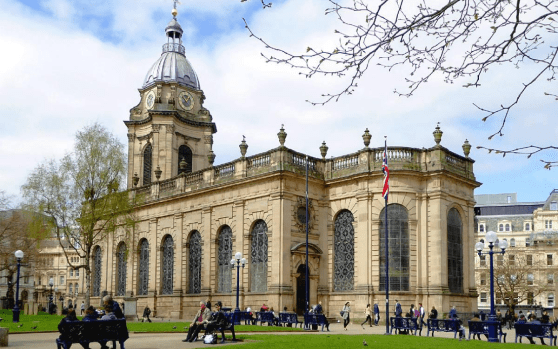Study in UK
Studying in the UK is a popular choice for international students due to the country’s reputation for academic excellence, cultural diversity, and high-quality education.
Universities in the UK are hubs of learning along with entertainment. UK also boasts of a remarkable record of 71 UK universities featuring in the QS World University Rankings with four currently ranked among the world’s top 10 which are: University of Cambridge, University of Oxford, UCL (University College London) and Imperial College London.
Higher education in the UK varies depending on the constituent state (England, Wales, Scotland or Northern Ireland).Undergraduate degrees generally take three years to complete. For a few selected subjects one can enroll in an undergraduate degree that leads directly into a master’s program – usually a total of four years long. Taken separately, master’s programs last one or two years, and PhDs at least three.
Students in UK
2,862,620
Total students enrolled
679,970
Total Int. Students
126,500
Total Students from India
390,615
Total Students from Asia
160
Universities
1,734,805
Undergrad Students
444,760
Post Grad Students
217,610
Int. Students–Management Stream
40,000 GBP - 71,000 GBP
Average Salary
160
Universities
1,734,805
Undergrad Students
444,760
Post Grad Students
217,610
Int. Students–Management Stream
40,000 GBP - 71,000 GBP
Average Salary
Top UK Admits Our Students Received
Why Study in the UK ?
Quality of education
Wide range of courses
Career opportunities



Cultural diversity
Language
Research opportunities
Popular UK Destinations to Study
-
Aberdeen
-
Manchester
-
Nottingham
-
Glasgow
-
Birmingham
-
Edinburgh
-
London







EduNirvana in UK

Donisha Maheshwari

Hia Sadho

Shaniya Singhai

Lakha Tiwari

Dr. Manish Khichi

Shreya Sahoo
Journey of Studying in the UK?
-
Admission Requirements
-
Intake
-
Jobs & Internships
-
Cost of Education
-
Visa Requirement
Graduate/Undergraduate
September/October Intake (Autumn Intake):
- This is the primary intake for most undergraduate and postgraduate programs.
- The application process for this intake usually starts around a year in advance, with application deadlines typically falling between January and June.
- It is the most popular intake, and many universities offer a wide range of courses and programs starting in September/October.
- International students are encouraged to apply early due to the competitive nature of admissions and the potential need for additional time for visa processing.
January/February Intake (Spring Intake):
Part-Time Work Opportunities
1. Regular Students: International students pursuing a full-time degree program at a recognized institution can work for a maximum of 20 hours per week during term-time. This includes both on-campus and off-campus employment. 2. Language Center Students: International students enrolled in a standalone English language course at a publicly funded institution can work for a maximum of 10 hours per week during term-time. It's important to note that during scheduled breaks (e.g., summer vacations), international students can work full-time.Post-Study Work Visa
The UK offers post-study work opportunities to international students upon completion of their degree programs. Here are the current regulations: 1. Bachelor's or Master's Degree Graduates: Students who complete a Bachelor's or Master's degree at a recognized institution are eligible for the Graduate Route visa. This visa allows them to work or look for work in the UK for a period of two years (or three years for Ph.D. graduates). During this time, there are no restrictions on the type of employment or minimum salary requirements. 2. Doctoral (Ph.D.) Graduates: Ph.D. graduates are eligible for an extended period of post-study work. They can stay in the UK for three years after completing their studies, during which they have the freedom to work in any role or industry. It's important to note that visa regulations and policies are subject to change, so it's advisable to consult the official UK government websites or seek advice from the university's international student support services for the most up-to-date information on part-time work opportunities and post-study work visas.Tuition Fees:
Tuition fees vary depending on the university and program of study. For international students, undergraduate tuition fees typically range from £10,000 to £38,000 per year, with medical degrees and programs in subjects like business and engineering at the higher end of the range. Postgraduate tuition fees can range from £10,000 to £50,000 per year, again depending on the field of study and the university.
Living Expenses:
Living expenses include accommodation, meals, transportation, study materials, and personal expenses. The cost of living can vary depending on the location of the university. In general, living costs are higher in major cities like London and lower in other parts of the country. On average, students should budget around £10,000 to £15,000 per year for living expenses.
Health Insurance:
International students are required to have health insurance coverage during their studies in the UK. The cost of health insurance can vary depending on the coverage and the provider. It is advisable to research and budget around £200 to £500 per year for health insurance.
Visa Costs:
International students are required to apply for a student visa to study in the UK. The cost of the visa application varies depending on the type of visa and the country of residence. As of 2021, the Tier 4 (General) student visa application fee starts at £348, and there may be additional costs for the Immigration Health Surcharge (IHS).
Additional Expenses:
Additional expenses may include application fees, examination fees, travel costs, and leisure activities. These costs will vary depending on individual circumstances and preferences.
To study in the United Kingdom as an international student, you will generally need to apply for a Tier 4 (General) student visa. Here are the typical visa document requirements for the UK:
- Confirmation of Acceptance for Studies (CAS)
- Valid Passport:
- Financial Evidence:
- Visa Application Form
- Biometric Information
- English Language Proficiency Proof
- Passport-Sized Photographs
- Academic Documents:
- CAS Statement and Offer Letter
- Visa Fee Payment
- Additional Documents
It's crucial to check the UK government's official visa application website and the specific requirements of your sponsoring institution for the most up-to-date information and guidance on the visa application process. Additionally, be prepared to attend a visa interview at a Visa Application Center if required, and submit all required documents in a timely and complete manner.
Our Loan Partners




Our Forex Partners
Our Accommodation Partners
Inspiring Journeys to Success



Scholarship: 4,000 GBP

Scholarship: 2,600 GBP


Scholarship: 2,000 GBP

Scholarship: 5,000 GBP










